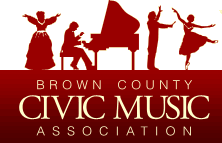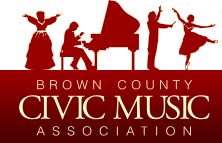Season Listing | Program | Program Notes | Biography
Since its founding in 1997, Red Priest — Piers Adams (recorder), Julia Bishop (violin), Angela East (cello) and David Wright (harpsichord) has given hundred sell-out concerts in many of the world’s most prestigious festivals.
Piers Adams (recorder) was recently heralded in the Washington Post as “the reigning recorder virtuoso in the world today.” He has performed in numerous festivals and at premiere concert halls throughout the world, including London’s Royal Festival, Wigmore and QueenElizabethHalls, and as concerto soloist with the Philharmonia, the English Sinfonia, the Irish Chamber Orchestra, the Academy of Ancient Music, the Singapore Symphony and the BBC Symphony. In addition to his work with Red Priest Piers has made several solo CDs reflecting an eclectic taste, ranging from his award-winning Vivaldi début disc to David Bedford’s Recorder Concerto — one of many major works written for and premiered by him. He has also researched, arranged and recorded many classical, romantic, impressionist and folk-influenced showpieces, which are a mainstay of his recital programs. For further information please visit www.piersadams.com
Julia Bishop (violin) is one of the outstanding baroque violin specialists of her generation, with a virtuoso style described in the BBC Music Magazine as “psychedelic.” She has toured the world with most of the U.K.’s leading period instrument orchestras, including the English Concert, of which she was a member for six years. Julia has worked extensively as an orchestral leader and soloist, in particular with the celebrated Gabrieli Consort, with whom she has performed internationally and appeared on numerous discs for Deutsche Grammophon. She has also appeared as concerto soloist with Florilegium, the Brandenburg Consort and the Hanover Band.
Angela East (cello) is widely respected as one of the most brilliant and dynamic performers in the period instrument world, praised in The Times, London, for the “elemental power” of her cello playing. She has given numerous concerto performances in London’s Queen Elizabeth and Wigmore Halls, and has performed as soloist and continuo cellist with many of Europe’s leading baroque orchestras. Among her impressive list of concert credits are La Scala, Milan, Sydney Opera House, Versailles and Glyndebourne. In 1991 Angela formed “The Revolutionary Drawing Room” which performs chamber works from the revolutionary period in Europe on original instruments, and whose first eight CDs have received glowing reviews world-wide. Her long awaited disc of Bach’s Cello Suites has recently been released on Red Priest Recordings. Her CD of popular baroque cello works, “Baroque Cello Illuminations,” has received excellent reviews and was chosen as “CD of the Fortnight” in Classical Music Magazine.
David Wright (harpsichord) has established himself as a prominent figure in the early music world. He was an almost entirely self-taught musician before gaining a scholarship to the Royal College of Music, where he won several prizes, including the International Broadwood Competition, and graduated with distinction. He has worked with some of the world’s leading musicians including Emma Kirkby and James Bowman and performed as a soloist with many groups of international renown. He has directed numerous concerts from the harpsichord, including the first modern performance of Arne’s The Blind Beggar of Bethnel Green, and is guest conductor to several orchestras on the continent. Much of David’s time in recent years has been devoted to performing the Goldberg Variations, which he recorded in 2007 and has since toured extensively. With many television and radio broadcasts to his credit, David continues to pursue a busy and varied career as a harpsichordist and became a permanent member of Red Priest in January 2011.
David Greenberg — Red Priest’s regular U.S. guest violinist — taught himself folk fiddle tunes by ear as a young child growing up in Maryland. In the mid ’80s he studied baroque violin with Stanley Ritchie. Greenberg spent the 1990s with Tafelmusik while developing a specialty in Scottish baroque-folk music, recording three groundbreaking CDs in this genre with the group Puirt A Baroque. He immersed himself in Cape Breton traditional music and co-authored the popular treatise on Cape Breton fiddle music, the DunGreen Collection, with his wife, Kate Dunlay. He lives in Halifax, Nova Scotia. In addition to Red Priest, regular collaborators include his own Tempest ensemble, David McGuinness, Chris Norman and Doug MacPhee.




